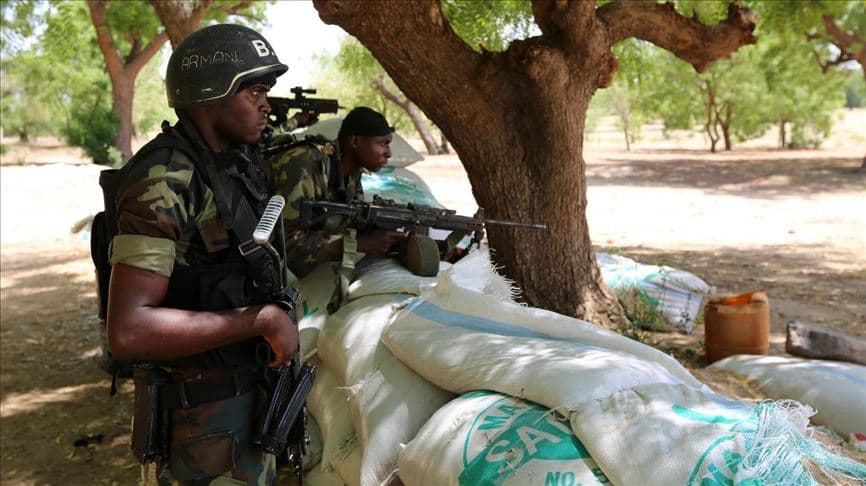YAOUNDÉ, Cameroon – Christians in the west African nation of Cameroon are expressing joy over the May 29 release of Father Elvis Mai Ngum, the pastor of a parish in the country’s troubled southwestern region.
The priest had been kidnapped Tuesday, May 28 as he made his way to one of the 11 mission stations he serves in the area.
In a May 29 statement, Bishop Agapitus Enuyehnyoh Nfon of Kumba Diocese expressed gratitude to the people of God for their prayers in seeking the release of the priest, and thanked God for heeding those prayers.
“It is with profound joy and thankfulness to God that I wish to inform you that news has just reached me that the Parish Priest of St. Martin de Porres Parish, Bekora, Father Elvis Mai, has been released,” the bishop’s statement reads.
“I wish to sincerely thank you all for the prayers you said for father’s release,” the bishop said.
“May the Lord reward you all for your solidarity,” Nfon said.
The bishop also thanked God for “touching the hearts of the abductors of father to release him safe and sound.”
“May the name of the Lord be praised, now and forever! Amen!” he said.
Nfon didn’t say what led to the release of the priest or whether any ransom was paid, nor did he say who kidnapped the priest.
It is widely believed, however, that Mai might have been taken by separatists who have been very active in the area, including sometimes targeting Christian leaders and structures as well as schools and hospitals.
One of the most egregious of the attacks came on October 24, 2020, when gunmen, suspected to be separatist fighters, stormed the Catholic-run Mother Francisca Bilingual Academy in Kumba. They shot and killed at least seven children, and injured many others.
On February 11, 2019, gunmen suspected to be separatist fighters attacked the Kumba Regional Hospital, reducing it to rubble.
While government authorities claim that peace is gradually returning to the troubled northwest and southwest regions, the kidnapping of Mai highlights the continuing separatist conflict.
Also on May 29, suspected separatists, who have made school boycotts a cornerstone of their resistance, attacked the St Frederik Comprehensive High School in the Bamenda where students were taking standardized examinations. Two students were injured, along with a police officer.
Cameroon’s English-speaking regions erupted into protests in 2016, following complaints by lawyers and teachers in the two regions. They were objecting to the mandatory use of French in Anglophone schools and courts.
The government took a hard line, and what were initially peaceful protests degenerated into violent confrontation. Many English-speaking Cameroonians from the northwest and the southwest took up arms, demanding independence from the rest of the country and the creation of a separate nation called Ambazonia.
It’s a crisis that was decades in the making.
Once a unified German territory, Cameroon became divided between the English and the French in 1916 following the defeat of Germany in the First World War. The present-day northwest and southwest regions, constituting 20 percent of the population of 28 million, were administered by Britain, and the rest of the country by France.
At independence in 1960, the two sides opted for a federation of two co-equal states that would preserve their different colonial heritages. That federation was scrapped in 1972 in favor of a unitary state. Ever since, Anglophones have complained of being a subjugated people, with their heritage systematically assimilated by the Francophone majority.
The armed uprising is now in its seventh year. According to the United Nations, it has killed over 6,000 people and displaced 765,000. Over 70,000 Cameroonians are refugees in Nigeria. At least 2 million people need humanitarian support and 600,000 children have been deprived of effective schooling, although experts caution these figures could be higher.
Catholic bishops in the two English-speaking regions have repeatedly called for an end to the violence, but seem not to agree on the prerequisites.
Bishop Michael Bibi of Buea, considered the capital of Anglophone Cameroon, says it will be hard to secure peace without justice, a position echoed by other prelates.
“If you have justice, peace will come naturally, because the fundamental cause of the conflict is the sense that injustice might have been perpetuated for far too long,” said Bishop George Nkuo of the Kumbo Diocese in comments to Crux.
Yet Archbishop Andrew Nkea Fuanya of Bamenda has taken a somewhat different line in earlier comments to Crux, arguing that it is critical first “to return to peace” and then “look for justice.”
For Nfon, truth and dialogue are the fundamentals for a return to peace. In a 2021 interview, the cleric urged both the government and the secessionist groups to “stand by the truth, embrace dialogue, look at each other as brothers and sisters and accept proposals that will enhance peace and harmony in our country.”
Cameroon has taken several steps to address the problem, including a 2019 Major National Dialogue that gave Anglophones some concessions, including the creation of regional assemblies, and the granting of a “special status” for the two Anglophone regions.
Separatists, however, insisted that the concessions didn’t go far enough, and many say they are no longer interested in staying part of Cameroon. Longtime President Paul Biya, for his part, has insisted that dividing Cameroon will never be an option.













